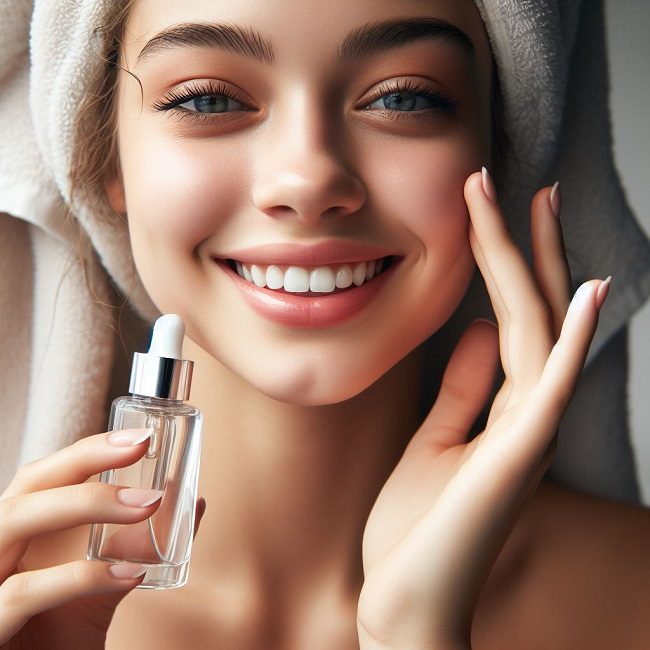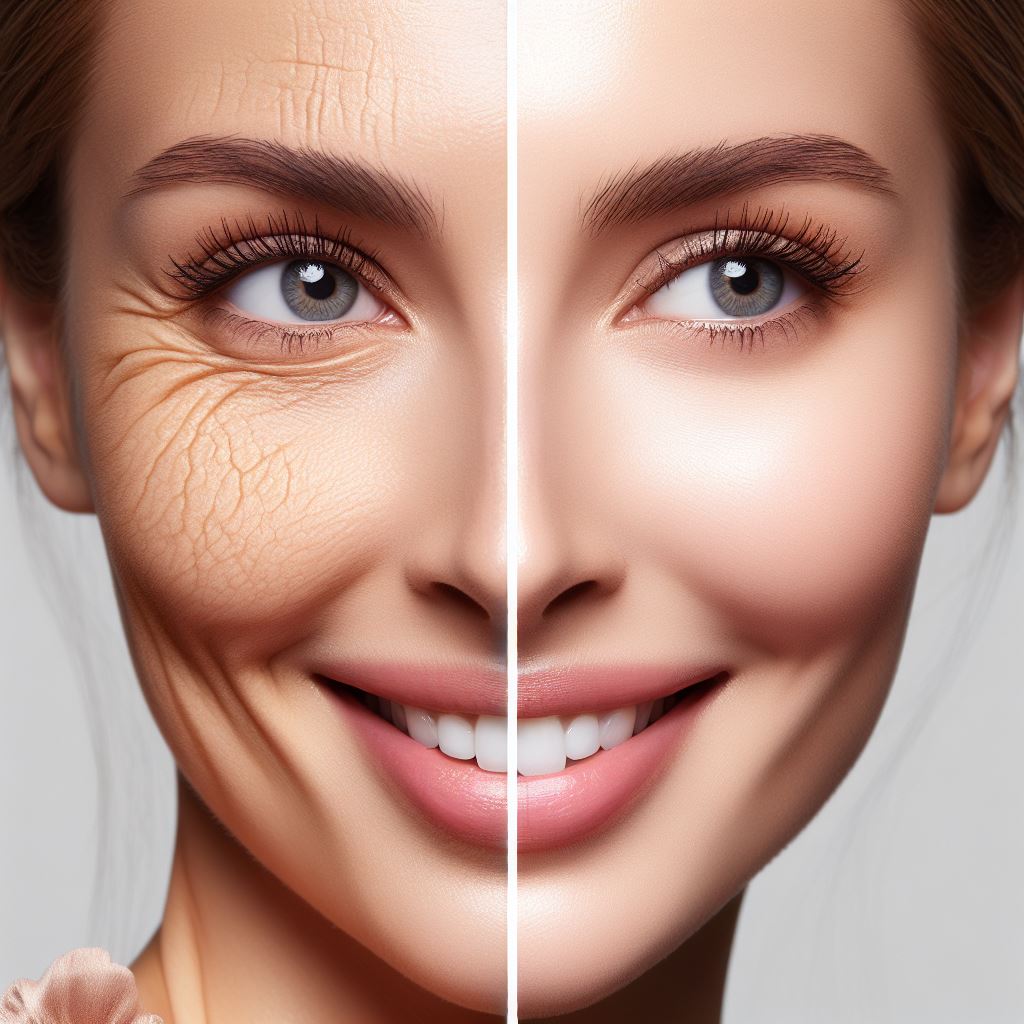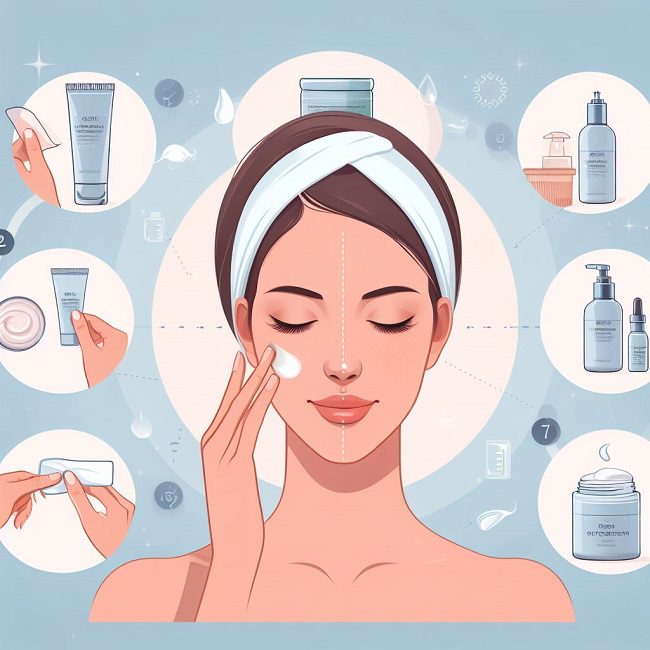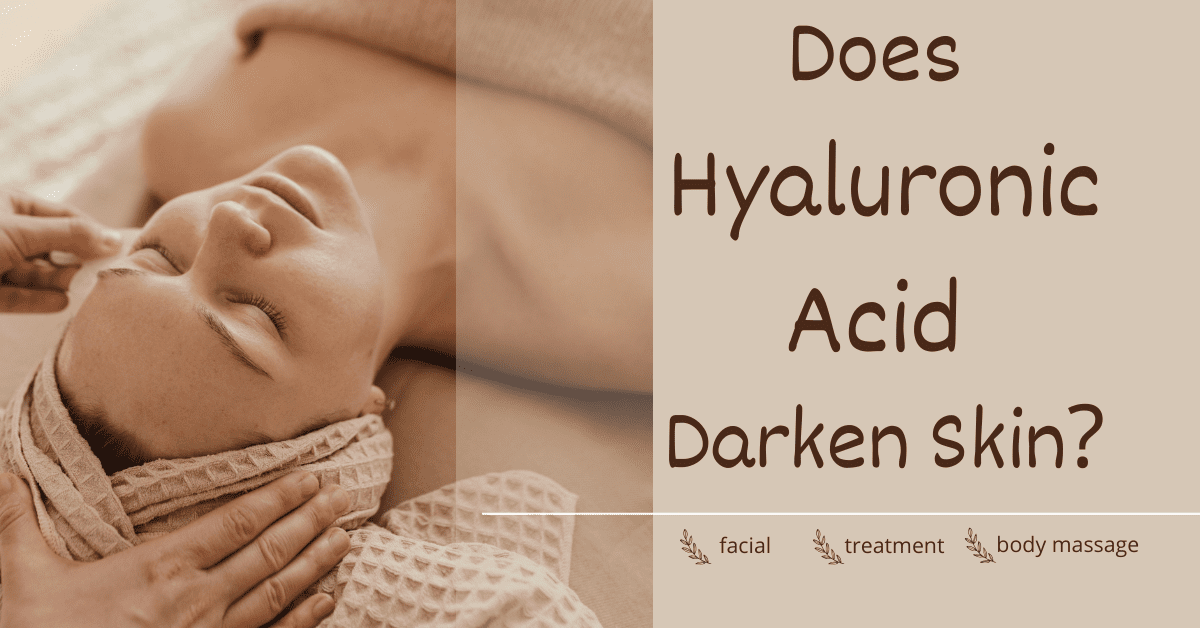If you’re trying to get beautiful, glowing skin, you’ve undoubtedly heard the word “Hyaluronic Acid” a few times. Because of its amazing moisturizing and anti-aging qualities, this ingredient is a superstar in skincare products. One persisting fallacy, meanwhile, is that “Does Hyaluronic Acid Darken Skin”.
We’ll examine the science of this well-liked beauty potion in this post and sort truth from fantasy.
In This Article
What is Hyaluronic Acid?

Hyaluronic Acid, also known as HA, is a chemical that is found naturally in human bodies. It is essential for preserving joint lubrication, skin hydration, and eye health. It’s most well-known in skincare for its extraordinary capacity to hold onto moisture. Because it can retain 1,000 times its weight in water, HA is a highly valued component of many cosmetic products.
What is The Role of Hyaluronic Acid in Skincare?
Hyaluronic acid is one component that has taken the beauty industry by storm when it comes to skincare. However, what is the precise function of hyaluronic acid in skincare products, and why is it regarded as the gold standard for skin health? We’ll go into the science, advantages, and useful uses of hyaluronic acid in your regular skincare regimen in this extensive guide.
1. Hyaluronic Acid: Your Skin’s BFF
Our bodies naturally contain hyaluronic acid, which is most concentrated in our skin, eyes, and connective tissues. It is essential for preserving the moisture of the skin and general wellness.
2. Hyaluronic Acid: The Science Behind It
Fundamentally, hyaluronic acid is an effective humectant. It can absorb more than a thousand times its weight in water, demonstrating its amazing capacity to retain moisture. This makes it a hydration powerhouse since it can suck water into your skin.
3. For all Skin types, Hyaluronic Acid
Hyaluronic acid is a unique substance that works with all types of skin. All skin types, including combination, oily, dry, and sensitive skin, can use it.
4. Benefits a Plenty
Hyaluronic acid has a lot of amazing effects. It’s a multipurpose marvel that can do anything from providing intensive hydration to minimizing the look of fine lines and wrinkles.
5. Real-World Implementation
It’s not as hard as you would imagine to incorporate hyaluronic acid into your skincare regimen. There’s something for everyone within the range of goods available, which includes sheet masks, creams, and serums.
You May Also Like- 5-Steps Korean Skincare Routine with Tretinoin: Glowing Secrets
Busting the Myth: Does Hyaluronic Acid Darken Skin?

The idea that hyaluronic acid may make skin appear darker is untrue. In actuality, HA cannot change color. **Hyaluronic Acid is clear and colorless**; using it does not cause the skin to become darker. If you’ve seen a darkening of your skin while using HA products, there may be other reasons, such as exposure to sunlight, hormonal changes, or interactions with other components in skincare products.
Factors That May Cause Skin Darkening
Several variables can cause skin to become darker but Hyaluronic acid is not the culprit. Many people may be concerned about skin discoloration. Other aspects contribute to this intricate issue; it’s not only about external causes like UV exposure. We’ll examine all the possible causes of skin darkening in this in-depth guide, highlighting some of the less well-known ones.
What is Skin Darkening

Before we get into the details, it’s important to understand what skin darkening is. The term “skin darkening” describes a shift in skin tone or the development of dark blotches or spots on the skin. Even though sun exposure is frequently linked to it, there are other factors as well.
1. The Sun’s Role: UV Radiation
Skin darkening is still mostly caused by sun exposure. Dangerous ultraviolet (UV) light from the sun causes the pigment melanin, which gives skin its color, to be produced. Extended exposure to ultraviolet radiation can result in sunburn, tanning, and hyperpigmentation.
2. Hormone Disorders: Chloasma and Melasma
Hormonal fluctuations can severely damage the look of your skin. Skin disorders called melasma and chloasma frequently develop during pregnancy or when using oral contraceptives. These illnesses may cause dark circles on the face, a phenomenon referred to as the “mask of pregnancy.”
3. Post-Inflammatory Hyperpigmentation: Aftereffect of Inflammation
Post-inflammatory hyperpigmentation (PIH) can be brought on by inflammation or skin trauma. Skin injuries, dermatitis, and acne may all cause the overproduction of melanin, which can result in dark patches that persist long after the original problem has gone away.
4. Genetic Variables: Racial and Family Aspects
Genetics has a major effect on how your skin reacts to different things. People may be more likely to acquire skin-darkening disorders if they have a family history of them. Furthermore, skin pigmentation can be influenced by race, with certain ethnic groups having a higher propensity to develop particular skin conditions.
5. Drugs and Cosmetics: An Unexpected Relationship
Drugs and cosmetics are also one of the reasons for Skin darkening. Certain medicines, such as antipsychotics and nonsteroidal anti-inflammatory drugs (NSAIDs), can cause photosensitivity, which increases skin sensitivity to sunlight. Certain cosmetics may contain substances that cause allergic responses or skin sensitivity, which can eventually cause the skin to darken.
6. Lifestyle Selections: Nicotine and Skin Conditions
Smoking and other unhealthy lifestyle choices can affect skin health. Smoking reduces the skin’s blood flow, depriving it of vital nutrients and oxygen, which can result in skin darkening and a dull complexion.
7. The Intricacy of Skincare: Overuse of Chemicals
Skin darkening can result from overusing skincare products with chemicals or from severe cosmetic procedures done without professional supervision. For instance, chemical peels may cause hyperpigmentation if not administered correctly.
8. Stress – The Quiet Abuser
Prolonged stress can cause damage to your skin. Stress hormones are released as a result, which may cause skin issues including pigmentation.
9. Darkening Associated with Pregnancy: Linea Nigra
The term “linea nigra” refers to the black vertical line that some pregnant women may acquire on their belly. Hormonal changes cause the skin to darken.
10. The Path to More Vibrant Skin
The first step in resolving this issue is comprehending the variables that might contribute to skin darkening. Certain causes are beyond our control, but we can control many of them with good skincare practices, lifestyle modifications, and, if necessary, medical intervention. A comprehensive strategy that takes into account both internal and exterior variables is necessary to get healthier, brighter skin.
You May Also Like- Get the Perfect Tan: Top 10 Designer Skin Tanning Lotion of 2023
How to Use Hyaluronic Acid in Your Skincare Routine?

To get the most out of hyaluronic acid, use it according to the following guidelines:
1. Use on Damp, Clean Skin
When applied to clean, wet skin, HA functions best. Make sure your skin is somewhat wet before using the product after cleaning. This method guarantees the best possible hydration and absorption.
2. Incorporate HA into Your Daily Routine
Include HA in your regular skincare routine. For continuous hydration, use it in the morning and at night.
3. Follow with a Moisturizer
Use a quality moisturizer afterward to seal in the moisture. As a barrier, the moisturizer keeps moisture from evaporating from the skin while amplifying the moisturizing benefits of HA.
Questions Related to “Does Hyaluronic Acid Darken Skin?”
Q1: Can I use hyaluronic acid with other skincare products?
Yes, hyaluronic acid is compatible with most skincare products and can enhance their effectiveness.
Q2: How often should I use hyaluronic acid in my routine?
You can use hyaluronic acid daily, both in the morning and at night.
Q3: Are there any side effects of using hyaluronic acid?
Generally, It’s easy to tolerate Hyaluronic acid, but it’s best to do a patch test to rule out any sensitivity.
Q4: Can hyaluronic acid be used for acne-prone skin?
Yes, hyaluronic acid is non-comedogenic and can be used for acne-prone skin.
Q5: Does hyaluronic acid darken skin?
Hyaluronic acid won’t make your skin darker. It is a secure and valuable component of skincare that can genuinely aid in brightening and balancing skin tone. While taking hyaluronic acid for the first time, any temporary redness or irritation should disappear within a few days.
Q6. Does Hyaluronic Acid help with dark spots?
Because it hydrates the skin, hyaluronic acid may aid with dark spots.
Q7: Can you go in the sun after using hyaluronic acid?
After utilizing hyaluronic acid, you can go outside, but you still need to wear sunscreen.
Q8: Is hyaluronic acid safe for 13 year olds?
For 13-year-olds, hyaluronic acid is usually safe but see a dermatologist first.
Q9: Does hyaluronic acid help hyperpigmentation?
Hyaluronic acid’s moisturizing properties can aid in the reduction of hyperpigmentation.
Q10: Does hyaluronic acid lighten dark spots?
Although hyaluronic acid does not remove dark spots, it can enhance overall skin tone.
Q11: How old should you be to use hyaluronic acid?
Hyaluronic acid is safe for use in many age groups; for further information, see a dermatologist.
Q12: Is hyaluronic acid good for melasma?
Hyaluronic acid encourages skin hydration, which may help melasma.
Conclusion
Hopefully, I was able to solve the query “Does Hyaluronic Acid Darken Skin?”. Hyaluronic Acid is a reliable ally in the skincare industry when it comes to achieving a radiant complexion. Brightening and rejuvenating the skin, it does not darken it.
Remember that HA is your buddy when you incorporate it into your daily regimen; it will work tirelessly to keep your skin youthful and wonderfully moisturized. Accept its ability to hydrate and take pleasure in the glowing effects.
Hyaluronic Acid is here to help you reveal the radiant, young skin you’ve always craved, so wave goodbye to the myth of “Does Hyaluronic Acid Darken Skin?”.
Hi, I'm Naznin! I really love making skin happy. I learned cool stuff about skincare and want to share it with you! Together, let's explore how to take care of our skin and feel awesome. Join me on this fun journey where we can be our beautiful selves!

